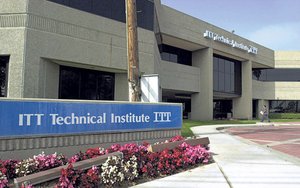
Blaming the U.S. Department of Education
for excessive oversight and sanctions, ITT Technical Institute — which had about 40,000 students enrolled on more than 130 campuses in 38 states — yesterday said it was pulling the plug
and shutting down.
“Except for a small school that operates under a different name, the move puts an end to an operation that has been accused of widespread fraud and abuse,” writes Patricia Cohen for the New York Times.
advertisement
advertisement
Late last
month, the Education Dept. banned the Carmel, Ind.-based school from enrolling new students who rely on federal financial aid. It also required that ITT set aside $247.3 million should it go out of
business.
“Experts called it a death sentence. On Tuesday, ITT blamed its closure on those sanctions, calling them ‘unwarranted,’ ‘inappropriate’
and ‘unconstitutional,’” write Justin L. Mack, Chelsea Schneider
and Stephanie Wang for the Indianapolis Star.
“These unwarranted actions, taken without proving a single allegation, are a ‘lawless execution,’ as noted by a recent editorial in the Wall Street Journal,” the school maintained
in its news release. It also said that it was letting go “the overwhelming majority of our more than 8,000 employees.”
But state and federal investigations into ITT
have been ongoing since 2002, Mack, Schneider and Wang point out.
“ITT currently faces fraud charges from the Securities and Exchange Commission and a lawsuit from
the Consumer Financial Protection Bureau. It has been under investigation by at least 19 state attorneys general,” they write.
“Some of ITT's attitude is
justified,” Credit Suisse analyst Trace Urdan tells them. “But it's certainly not the case that the Department of Education did this to them. They did this to themselves.”
“ITT’s closure comes after Corinthian Colleges Inc. shut the doors of its schools and filed for bankruptcy last year. The Education Department agreed to forgive $171 million in
loans owed by former students, most of them in California,” point out Jim Puzzanghera and Ronald D. White in
the Los Angeles Times.
“‘Both Corinthian and ITT made the same bad decision, which was to guarantee third-party private loans’ while pushing out more
students into a weak jobs market after the Great Recession,” Urdan tells them.
But there were other issues, too.
“In blocking new students from
enrolling, the Education Department cited the actions of ITT's accreditor, the Accrediting Council for Independent Colleges and Schools, which determined that ITT ‘is not in compliance and is
unlikely to become in compliance with [ACICS] accreditation criteria,’” reportsInside Higher
Ed. “According to the department, ACICS questioned ITT's compliance with standards such as financial stability, management, record keeping, admissions, recruitment standards, retention, job
placement and institutional integrity, in an Aug. 17 letter sent to the department.”
A page on ITT’s Web site touts
its “power packed programs” in fields such as information technology, electronics technology, drafting and design, business, nursing and health sciences. Another page warns that credits earned there “are unlikely to transfer” and states that the company “does not represent, promise or
guarantee that a student or graduate will obtain employment.”
Undersecretary of Education Ted Mitchell yesterday told reporters that “the department is reaching
out to ITT students directly to inform them about their options,” reports Danielle Douglas-Gabriel in the Washington
Post. “He said the department is also hosting a series of webinars this week and partnering with states to hold on-site sessions to help ITT students. The department is asking community
colleges near ITT locations to accept academic credits from the career school.”
If students are successful in transferring their credits to other institutions
to complete the same degree, they will not be eligible for federal student loan forgiveness, however.
Daniel Webster College in Nashua, N.H., is the one school owned by ITT
that remains open. Acquired in 2009, it serves about 650 students on a 54-acre campus and has 21 full-time and 67 part-time faculty members, according to Kimberly Houghton’s story in the Manchester Union Leader.
“Without the parent company’s support, it will be difficult for DWC to operate,” its president, Michael Diffily, wrote in a letter to students, Houghton reports.
“Several institutions also accredited by (New England Association of Schools and Colleges) have approached ITT and have expressed interest in acquiring the college, which would be a good thing
for DWC.”
“It’s too simplistic to look at today’s closure as just the result of actions by the Department of Education,” Ben Miller, senior
director for postsecondary education at the Center for American Progress, tells the Post’s Douglas-Gabriel. “Years of mismanagement by ITT leadership put it in a position where
ED’s action was necessary and impossible to survive.”